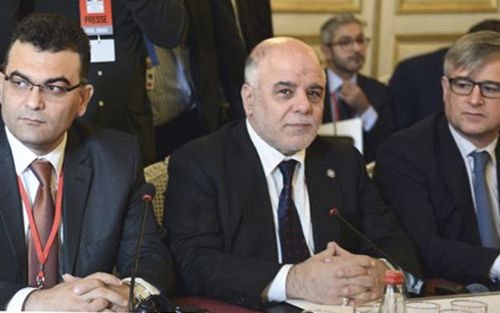International Conference Against IS: Passing the buck for defeat against IS
Speaking at the meeting, German Foreign Minister Frank Walter Steinmeier stressed that a military solution must be accompanied by political reconciliation in Iraq.
The international conference against the Islamic State (IS) group ended on the evening of June 2 after a day of meetings in Paris (France), with a commitment to further increase support for Iraq against IS. Although there was a high consensus among countries to continue supporting Iraq, the statements of the parties at the conference showed that new cracks appeared between Iraq and its international allies over recent consecutive defeats against IS.
 |
| Iraqi Prime Minister al-Haydar Abadi and the anti-IS coalition during a meeting in Paris, June 2, 2015 (photo: AP) |
The anti-IS coalition on June 2 pledged support for Iraq's plan to retake the city of Ramadi from the Islamic State group, which Iraqi Prime Minister Haider al-Abadi called a "failure" of the international community. In addition to pledging financial and weapons support for Iraq, the foreign ministers of 20 countries also affirmed that the Shiite-controlled government in Iraq needs to improve its relations with the Sunni community, thereby ensuring effectiveness in the fight against IS.
Speaking at the meeting, German Foreign Minister Frank Walter Steinmeier stressed that a military solution must be accompanied by political reconciliation in Iraq. “We do not expect a military victory to come easily. We also know that achieving peace is difficult. That is why at this conference we are not only talking about the need for military measures but also about what is needed to bring stability to areas not under IS control,” the German Foreign Minister said.
However, cracks have begun to appear between Iraq and its allies in the fight against IS, as Prime Minister al-Abadi on June 2 rejected claims that the government's lack of efforts to reconcile with the Sunni community and sectarian divisions in Iraq were the cause of recent failures in the fight against IS.
Mr. al-Abadi also accused the international coalition of not fulfilling its commitments to help Iraq deal with IS. According to the Iraqi Prime Minister, the international community is supporting Iraq, but the country needs more intelligence and weapons from the coalition. Iraq is currently receiving less support than what the international community has pledged.
The Iraqi Prime Minister also affirmed that the fight against IS is not Iraq's sole mission: "As you know, IS did not originate in Iraq, nor was it developed in Iraq but in Syria. IS is supported by forces outside Iraq, including foreign fighters. Iraq can sacrifice itself to fight IS, but the international community, including the international coalition, needs to support us in destroying IS."
However, to ensure continued support in the fight against IS and to ease international concerns, the Iraqi Prime Minister on June 2 affirmed continued efforts to reconcile factions and announced plans to retake Ramadi from IS.
The plan includes increasing the training and equipping of local Sunni militias and increasing recruitment of new Iraqi army personnel. In order to avoid tensions between Sunni and Shiite factions in Iraq, Mr. al-Abadi requires all these groups to operate under the supervision of the Baghdad government.
Sectarianism has long existed in Iraq, not only hindering the coalition's progress in the fight against IS, but also pushing this Middle Eastern country into continuous conflict for many years. What is worrying is that although Sunni communities in Iraq do not support the extremist Islamic State group, they are also afraid to cooperate with Shiite militias after many years of conflict.
In a sign of Iraq's lingering sectarian divisions that could complicate the fight against IS, the autonomous Kurdish region in the north on June 2 criticized the government for "excluding" its voice at the conference in Paris.
The autonomous Kurdish region in Iraq has also been a "headache" for the Baghdad government for a long time. This force has always stood side by side with the Iraqi army in the fight against IS since the armed group expanded its control, but Kurdish leaders want to hold a referendum on the region's independence - something the Iraqi government has always opposed./.
According to VOV.VN


